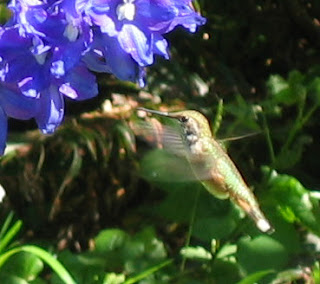Hummingbird hearts beat 1,260 to 1,400 times per minute or average 23 beats per second. Their wings beat 55 to 75 times per second, creating the famous humming noise. They live an average of three years. Some migrate thousands of miles in a single season, following the blooming plants. They need to eat (flower nectar and tiny insects) about every ten minutes to maintain their metabolism. They can’t walk or hop, but they can hover. Their two-inch-wide nests are made of plant down, spider webs, and stray bits of fluff.
“My” green and tan hummingbirds love blue sage and lavender spikes, ripe black mulberries, and pink orchid trees. They’re boldly curious little beasts, hovering close and checking me out as I water the plants or read in my garden nook. They perch in the trees, do aerobatics, and buzz the dog’s head. When they scold my cats for just existing, their chirps can be heard many meters away. The tiny ones peer in the kitchen window as I’m preparing a meal. When the young hummer is temporarily abandoned in the orchid tree, she chitters for her parents for ten minutes before she’s hungry enough to seek and sip her own nectar (which was why she was “abandoned” in the first place).
Hummingbirds are so inoffensive--and beloved--that when they get into a house through an open window or door, we try everything to lure them back outside. When a hummer came into my kitchen through a door but kept butting the window looking for a way out, I put the cats behind a door, and tried luring it with a big red advertisement. No luck. So I went outside, took off the screen, and gently and slowly opened the window. Still the bird wouldn't go out the open side. So I slowly and quietly shooed it toward the open air and it flew away like a lightning bolt.
I was researching 17th-century New England for a book I'm writing, and came across this description of a hummingbird. The writer, William Wood, published his 1634 book on natural history for the English Puritan emigrants. Hummingbirds were unknown in the Old World, so this was a new species to them.
The Humbird is one of the wonders of the Countrey, being no bigger than a Hornet, yet hath all the demensions of a Bird, as bill, and wings, with quills, spiderlike legges, small clawes: For colour, she is as glorious as the Raine-bow; as she flies, she makes a little humming noise like a Humble-bee: wherefore shee is called the Humbird.

Like many other species, the hummingbird is not mentioned in the Bible, which is admittedly not a scientific nature handbook. They are native to the Americas, not to the Bible lands. Would it be a stretch to liken our desire for a relationship with the Lord, to a hummingbird’s heart? Imagine that with every heartbeat (and at 23 beats per second it’s humming, too), you would “Love the LORD your God with all your heart and with all your soul and with all your strength.” Deuteronomy 6:5 NIV
Perhaps this hum is an example of having a song in your heart. A miserable heart means a miserable life; a cheerful heart fills the day with song. Proverbs 15:15 MSG


Hi, I am a student studying GCSE IT and I was wondering if I could have permission to use one of your pictures on your website to use for my Aida coursework.
ReplyDeleteI ensure that it will not be published.
Thank you.
Since you are unidentified, Anonymous, with no blog or email to contact you, how do I grant or withhold permission? The two bird pictures were found on Google Images search (same way you probably found them here in my blog). The nest/orange picture is my own photograph.
ReplyDelete